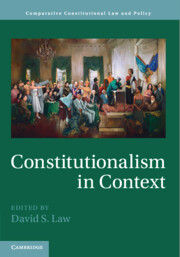Book contents
- Reviews
- Constitutionalism in Context
- Comparative Constitutional Law and Policy
- Constitutionalism in Context
- Copyright page
- Dedication
- Contents by Topic
- Contents by Region
- Figures
- Tables
- Contributors
- User’s Guide and Preface
- Abbreviations
- I Introduction to the Field
- 1 Introduction: Pedagogy and Conceptualization of the Field
- 2 The State of the Field
- 3 Methodology and Research Design
- II Concepts and Definitions
- III Constitutional Drafting and Revision
- IV Constitutional Adjudication and Interpretation
- V Rights
- VI Structure
- VII Challenges to Liberal Democratic Constitutionalism
- Index
- References
3 - Methodology and Research Design
from I - Introduction to the Field
Published online by Cambridge University Press: 17 February 2022
- Reviews
- Constitutionalism in Context
- Comparative Constitutional Law and Policy
- Constitutionalism in Context
- Copyright page
- Dedication
- Contents by Topic
- Contents by Region
- Figures
- Tables
- Contributors
- User’s Guide and Preface
- Abbreviations
- I Introduction to the Field
- 1 Introduction: Pedagogy and Conceptualization of the Field
- 2 The State of the Field
- 3 Methodology and Research Design
- II Concepts and Definitions
- III Constitutional Drafting and Revision
- IV Constitutional Adjudication and Interpretation
- V Rights
- VI Structure
- VII Challenges to Liberal Democratic Constitutionalism
- Index
- References
Summary
Despite the tremendous renaissance of comparative constitutional law, the comparative aspect of the enterprise, as a method and a project, remains under-theorized and imprecise. Methodological self-awareness has not been one of the field’s strengths. In comparative constitutional law (and Constitutionalism in Context more generally) the term “comparative” is often used indiscriminately to describe what, in fact, are several different types of scholarship, each with its own meanings, aims and purposes. What is more, various vocational, jurisprudential, academic, and scientific stakeholders involved in practicing the art of constitutional comparison. This chapter will explore the various types, aims and methodologies deployed in exploring constitutional phenomena comparatively across time and space. In so doing, it will identify some gaps in the field’s contemporary methodological matrix and suggest ways in which these deficiencies may be addressed and overcome.
Keywords
- Type
- Chapter
- Information
- Constitutionalism in Context , pp. 41 - 58Publisher: Cambridge University PressPrint publication year: 2022

